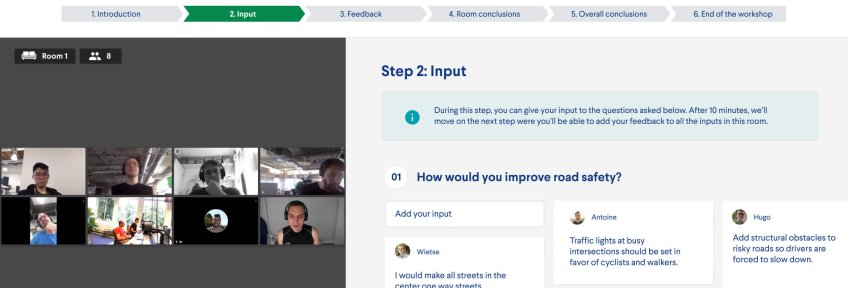Innovative response
Citizen workshops are an essential piece of our local democracies. They allow live interactions, in-depth discussion, and help consensus emerge. Up until now, they were being held offline, whilst online platforms are usually reserved for indirect and asynchronous participation - think voting, surveys or participatory budgeting. However, the current crisis has made these essential in-person meetings impossible.
CitizenLab's workshop feature has been designed to expand the scope of online engagement and help ensure democratic continuity. It allows for real-time in-depth engagement, helping councils organise deliberation and reach consensus with their citizens entirely online. The feature combines video presentation with traditional participation methods like idea collection, idea grouping or voting. The online workshops follow a clear step-by-step path, which has been modelled on traditional town hall meetings:
1. the project administrator greets participants and presents the topic(s) at hand. At this point administrators can also share information and resources to be used in later stages.
2. participants break out into "rooms" where they discuss the topic amongst themselves. Using video chats and traditional participation features, they come up with suggestions, debate solutions amongst themselves, vote for the ideas and then summarise their input into the "room conclusions".
3. Participants come back to the main session where input from all groups is discussed and then merged into overall group solutions.
This final input can then be submitted to wider citizen approval.
Specific issues addressed and anticipated impact
When speaking of citizen engagement, we tend to separate participation from deliberation. Participation aims to encourage simple actions like voting or contributing ideas - it can easily be done on a large scale, but it doesn't usually generate very qualitative engagement.
Deliberation, on the other hand, leads to deep, small-scale engagement. It is used to inform citizens, maintain democratic dialogue, and reach consensus in sometimes tense situations. The most striking examples of the power of deliberation have been Ireland's citizens' assemblies, which after a few weeks of informed discussions unexpectedly made recommendations in favour of same-sex marriage and abortions, opening the way for public referendums which approved both.
Digital engagement tools are usually geared towards participation, rather than deliberation. They are good at reaching large numbers of citizens, but they aren't built for the type of real-time, meaningful deliberation that's needed to reach a consensus. Until, now, deliberation was therefore mainly done offline, on a small scale, with representative samples of population. The absence of viable digital tools for deliberation had often been flagged by civic tech activists and political thinkers - but the current crisis suddenly made it urgent to find a solution.
Our tool was built to help local governments ensure democratic continuity by giving them a way to move their townhall meetings online. It was built during the crisis, but it wasn't built for the crisis. We believe that online deliberation isn’t a temporary solution, or a trade-off. We see it as a way to reach a larger, more diverse audience than the usual suspects of a town hall meeting. We believe it can be used on a local scale, but also on a regional, national or international level to help groups of citizens reach consensus and make collective decisions.
Organisations/institutions involved
- CitizenLab is developing the solutions.
- Local governments are preparing and leading the workshops.
Potential issues
In the coming months, we are planning to do the following:
- Develop the workshops for mobile, to have an inclusive solution for regions where smartphone coverage is way higher than desktop coverage (e.g. Chile).
- Add cocreation methods to the features that are available in the sessions (e.g. drawing a map together)
- Use AI to help guide a group discussion and visualise the results/conclusions
- Regional/State government
- Local government
- Private Sector
- Non-Profit/Civil Society
Issues being addressed:
- Information and practice sharing (with public and/or internal)
- Governance responses
- Crowdsourcing solutions
Response contact:
Date Submitted:
30 April 2020


